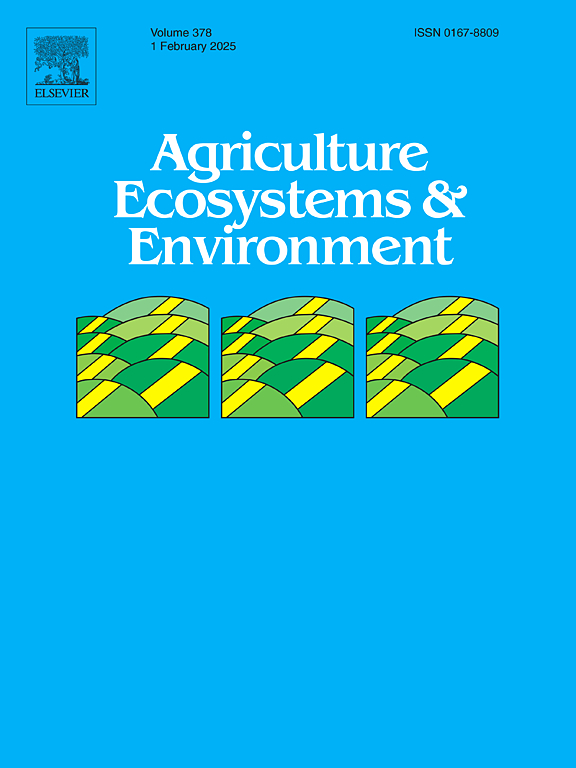Agricultural management and associated landscapes influence wild plant communities, nest colonization, and the pollen diet of unmanaged populations of mason bees
IF 6.4
1区 农林科学
Q1 AGRICULTURE, MULTIDISCIPLINARY
引用次数: 0
Abstract
Bees are pollinators of both wild and crop plants with significant ecological and economic value. However, recent studies report declines in their populations, particularly in agricultural landscapes. Compared to conventional farming, organic agricultural management is considered less harmful to biodiversity. Despite this, studies addressing wild bees in organic systems remain limited. In this study, we selected organic and conventional farms to examine the influence of farming management on meadow flora. We also accessed landscape-level management and its influence on newly colonized nest of mason bees and their pollen diet. Our results show that organic farming promotes higher plants diversity in meadows. Analyses of pollen inside mason bee nests revealed a more diverse diet in landscapes with a greater proportion of organic fields. Additionally, the number of newly colonized nests increased with the extent of organically managed areas. These findings indicate that organic farming can enhance meadow plant diversity, positively influence the pollen diet of wild bees, and support larger populations of solitary bees. Environmental management aimed at sustainability helps to safeguard the diversity of both plants and mason bees. Overall, sustainable environmental management that increases organic farming coverage in agricultural landscapes holds substantial potential for protecting solitary bee populations.
农业管理和相关景观影响野生植物群落、巢定植和未管理的mason蜂种群的花粉饮食
蜜蜂是野生和农作物的传粉者,具有重要的生态和经济价值。然而,最近的研究报告它们的数量在下降,特别是在农业景观中。与传统农业相比,有机农业管理被认为对生物多样性的危害较小。尽管如此,关于有机系统中野生蜜蜂的研究仍然有限。在本研究中,我们选择了有机农场和传统农场来研究耕作管理对草甸植物区系的影响。我们还探讨了景观水平管理及其对石匠蜂新落巢和花粉摄食的影响。我们的研究结果表明,有机农业促进了草甸植物多样性的提高。对石匠蜂巢内花粉的分析显示,在有机农田比例较大的地区,石匠蜂的饮食更加多样化。此外,随着有机管理区域的扩大,新定居巢穴的数量也在增加。这些结果表明,有机农业可以增加草甸植物多样性,积极影响野生蜜蜂的花粉饮食,并支持更大的独居蜜蜂种群。以可持续发展为目标的环境管理有助于保护植物和石匠蜂的多样性。总体而言,可持续的环境管理增加了农业景观中有机农业的覆盖范围,对保护独居蜜蜂种群具有巨大的潜力。
本文章由计算机程序翻译,如有差异,请以英文原文为准。
求助全文
约1分钟内获得全文
求助全文
来源期刊

Agriculture, Ecosystems & Environment
环境科学-环境科学
CiteScore
11.70
自引率
9.10%
发文量
392
审稿时长
26 days
期刊介绍:
Agriculture, Ecosystems and Environment publishes scientific articles dealing with the interface between agroecosystems and the natural environment, specifically how agriculture influences the environment and how changes in that environment impact agroecosystems. Preference is given to papers from experimental and observational research at the field, system or landscape level, from studies that enhance our understanding of processes using data-based biophysical modelling, and papers that bridge scientific disciplines and integrate knowledge. All papers should be placed in an international or wide comparative context.
 求助内容:
求助内容: 应助结果提醒方式:
应助结果提醒方式:


